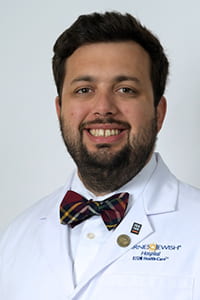
I vividly remember the match process from two years ago — the application, the nervous wait for interview invitations, the frantic packing (and unpacking) of a suitcase, and, most importantly, opening that letter. As a medical student, it can be hard to know what to look for in a residency program because you really do not know what you are looking for; you have never really done anything like this before.
As an MD-PhD and aspiring physician-scientist, I essentially broke down my interviews into two broad categories: clinical training and scientific training. In the end, WashU was the best fit for both my clinical and scientific needs. With regards to clinical training, I believe there can be few better places than our institution. In fact, the one thing I hear over and over again when I go to conferences or meet practicing anesthesiologists is about the quality of residents trained at WashU. Barnes-Jewish Hospital is a tertiary care institution pulling from most of Missouri as well as routinely from neighboring states (Illinois, Iowa, Arkansas, and Kentucky) and internationally. You will see a wide range of pathologies and patient presentations.; you will be challenged. The great aspect of this institution, though, is that you will never be on an island, there is always someone there to help, whether it is your fellow residents, our fantastic clinical fellows, your attending, or even other services’ attendings. The institution is very collegial and everyone is here to care for the patients. In terms of anesthesiology training, one major advantage this program has is exposure to subspecialty anesthesiology your CA-1 year. As a CA-1, I did cardiac, OB, pain, and pediatric anesthesiology. This training has elevated what I am capable of and comfortable with in other settings (i.e., in the ICU or other general ORs). I think it is an invaluable experience and is part of what makes our training so unique. As we are a large institution with essentially every sub-specialty area of anesthesiology available, there is plenty of room for you to explore your own interests here with us.
When it comes to scientific endeavors, WashU is second to none. Our department consistently ranks either first or second in total NIH funding. Our research programs are quite diverse ranging from basic science to clinical trials. We are doing significant work in all frontiers of anesthesiology, ranging from basic endeavors such as mechanisms of general anesthesia and studies on consciousness to applications of the latest technologies, such as the use of machine learning in anesthesiology and critical care settings. All of our residents are welcome to participate in the scientific endeavors of our community, whether you just want to come to Science Garage and listen to the latest and greatest that is happening in our department or if you want to get your hands dirty and contribute to advancing anesthesiology, I promise there is a place here for you!
Lastly, I wanted to comment on the camaraderie among residents here. As part of any residency, you will be working long hours at the hospital in very physically and mentally demanding situations. Our residents carry friendly faces and are always willing to lend a hand or some advice when you need it. We have quite a few social gatherings, including a department-sponsored get-together every month. These are always fun and a way to get to know your fellow residents (and their families) outside the confines of the hospital.
I hope you will take a closer look at our program and even join us here in St. Louis!